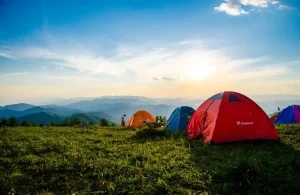Introduction: Understanding the Great Outdoor Debate
Camping is one of the most fun and exciting ways to enjoy the outdoors. It’s a chance to disconnect from the city and connect with nature. Imagine sleeping under the stars, hearing birds chirping in the morning, or sitting by a cozy campfire. But when it comes to camping, you have two popular choices: tent camping and RV camping.
Tent camping means you’ll be sleeping in a tent, close to nature, and enjoying a more adventurous experience. On the other hand, RV camping allows you to stay in a comfortable camper with amenities like beds and a bathroom.
So, which one is right for you? In this article, we’ll explore the pros and cons of both tent camping and RV camping to help you decide which one suits your style. Whether you’re a camping for beginners or a seasoned camper, this guide will help you make the best choice for your next adventure.
What is Tent Camping?
Tent camping is when you pitch a tent and stay in the great outdoors. You’ll have to bring all your gear, like sleeping bags, flashlights, and food, and set everything up yourself. It’s a great way to feel close to nature.
Why Tent Camping Is Popular
Tent camping is very popular among people who love the outdoors. Did you know that over 40 million Americans go tent camping each year? Many outdoor enthusiasts choose tent camping because it’s affordable, easy to set up, and allows them to connect with nature in a meaningful way.
Personal Opinion: Simplicity Connects You to the Outdoors
There’s something special about tent camping that makes you feel more connected to the outdoors. Without the comforts of home, you focus more on the natural surroundings, the people you’re with, and the activities you’re doing. The simplicity of tent camping is what makes it so rewarding. It’s a great way to unplug, relax, and enjoy the beauty of nature.
What is RV Camping?
RV camping is when you stay in a recreational vehicle, which is like a home on wheels. RVs have beds, kitchens, and even bathrooms, making your camping trip more comfortable.
Popularity Among Families and Retirees: Why RV Camping Is Growing
RV camping is especially popular among families and retirees. For families, it offers plenty of space for everyone to relax and enjoy themselves. Retirees often choose RV camping because it provides a comfortable way to travel and explore new places without the physical demands of tent camping. The RV industry is growing rapidly, with a projected annual growth rate of 7%. This growth shows just how much people love the comfort and flexibility RV camping offers.
Personal Opinion: Enjoy Nature Without Sacrificing Comfort
I think RV camping is fantastic for anyone who wants to experience nature without giving up the comforts of home. If you’re looking for a way to camp with your family or friends in style, RV camping is a great choice. And with so many RV options available, you’re sure to find one that fits your needs.
Why Families and Retirees Love RV Camping
- Space: RVs offer plenty of room for the whole family to spread out and relax.
- Comfort: With beds, kitchens, and bathrooms, RVs make camping trips more enjoyable, especially for those who want to avoid the challenges of tent camping.
- Flexibility: RVs allow you to travel to different places without worrying about setting up a tent each time.
Why Camp?
People love camping for many reasons:
- Spending quality time with family and friends.
- Enjoying nature and fresh air.
- Relaxing and reducing stress.
- Trying new outdoor activities, like hiking or fishing.
- Some others like the challenges.
Now that you know the basics, let’s dive deeper into the pros and cons of each camping style to help you decide which one is right for you!

Understanding Tent Camping
A. Definition of Tent Camping
Tent camping is an exciting and versatile way to connect with nature. It ranges from backpacking, where you carry everything on your back, to car camping, where you drive to your campsite. Whether you’re hiking through the wilderness or setting up near a lake, tent camping offers a chance to disconnect from the hustle and bustle and enjoy the great outdoors.
B. Types of Tents
- Backpacking Tents: Lightweight and compact, designed for long hikes.
- Family Tents: Spacious and comfortable, perfect for camping trips with loved ones.
- Car Camping Tents: Easy to set up and roomy, ideal for weekends at campsites.
- Specialty Tents: Includes innovative options like rooftop tents, which mount on vehicles for easy setup.
C. Essential Tent Camping Gear
- Sleeping Bag and Pad: For a cozy night’s sleep under the stars.
- Cooking Equipment: A portable stove and mess kit to prepare your meals.
- Lighting: A reliable flashlight or lantern to brighten up the night.
- Weather-Appropriate Clothing: Layers for fluctuating temperatures and durable gear for outdoor adventures.
D. Personal Opinion on Tent Camping
There’s something magical about tent camping. It’s more than just setting up a tent; it’s about immersing yourself in nature, embracing simplicity, and finding joy in the basics. Tent camping connects you to the earth and gives you a sense of accomplishment as you build your own shelter. It’s eco-friendly and offers a sense of freedom that’s hard to find elsewhere.

Understanding RV Camping
A. Definition of RV Camping
RV camping involves staying in a recreational vehicle equipped with amenities like beds, kitchens, and sometimes bathrooms. It comes in different forms, including motorhomes, travel trailers, and campervans, offering various levels of comfort and space.
B. Key Differences from Tent Camping
RV camping is all about comfort and convenience. Unlike tent camping, RVs provide shelter, beds, and kitchen facilities, making it easier to enjoy nature without sacrificing modern comforts. It’s ideal for families or those seeking a more relaxed camping experience, especially in harsh weather conditions.
Why Choose RV Camping?
RV camping is perfect for those who want to explore the outdoors while maintaining the comforts of home. It’s great for longer trips and offers a cozy retreat, making it a popular choice for many campers.
Pros and cons
Now that we have a better look at both tent and Rv camping, let’s deep dive into the pros and cons of each one of them, giving as much comparison as possible to clarify the key differences between the two of them, and make it easier to decide on weather would you prefer tent of Rv camping.
The Pros of Tent Camping
Tent camping is a timeless and rewarding way to connect with nature, offering a wide range of benefits that make it a preferred choice for many outdoor enthusiasts. Whether you’re a seasoned camper or a camping for beginners, tent camping has much to offer. Below, we’ll explore the pros of tent camping in detail.
A. Affordability
One of the most significant advantages of tent camping is its cost-effectiveness.
- Lower Upfront Costs: Tents are much cheaper than RVs, with quality options available for as little as $100–$300. In contrast, RVs can cost anywhere from $10,000 to over $100,000. check out our guide to choosing a budget-friendly one to start with.
- Reduced Maintenance and Storage Expenses: Tents require minimal maintenance and can be easily stored in a closet or garage. RVs, on the other hand, require regular upkeep, insurance, and storage fees.
- Cheaper Campground Fees: Tent camping sites are often more affordable than RV sites. For example, the average cost of a tent site in a national park is around $20–$30 per night, compared to $50–$100+ for RV sites with full hookups. if you are looking to rent and Rv, Check out our review about Rvs
Statistic: According to the National Park Service, the average tent camping site in a national park costs $23 per night, while RV sites with full hookups average $50 per night.
B. Flexibility and Accessibility
Tent camping offers unmatched flexibility and access to remote locations.
- Access to Remote and Secluded Locations: With a tent, you can hike to backcountry campsites or set up in areas inaccessible to RVs. This allows for a more immersive and peaceful camping experience.
- Ease of Setup and Teardown: While setting up a tent can take some time, it’s often quicker and less labor-intensive than hooking up an RV.
- Lightweight and Portable: Modern tents are designed to be lightweight and easy to carry, making them ideal for backpackers and adventurers.
Personal Opinion: I’ve had some of my most incredible camping experiences in secluded spots that were only accessible by hiking with a tent. There’s something special about pitching your tent in a remote wilderness area, surrounded by nothing but nature.
C. Immersion in Nature
Tent camping provides a direct connection to the environment, allowing you to fully immerse yourself in nature.
- Direct Connection with the Environment: Without the walls of an RV, you’re more attuned to the sights, sounds, and smells of the outdoors.
- Enhanced Sensory Experiences: Falling asleep under the stars and waking up to the sounds of birdsong are unique experiences that tent camping offers.
- Reduced Light and Noise Pollution: Camping in remote areas often means darker skies and quieter surroundings, giving you a chance to disconnect from urban life.
D. Physical Activity and Health Benefits
Tent camping encourages physical activity and offers numerous health benefits.
- Hiking and Backpacking: Carrying your gear and hiking to a campsite is a great workout and a chance to explore scenic trails.
- Stress Reduction: Spending time in nature has been proven to reduce stress and improve mental well-being, (we all know that).
- Outdoor Activities: Tent camping often involves activities like swimming, fishing, and exploring, which keep you active and engaged.
Statistic: Studies have shown that spending time in nature can lower cortisol levels, improve mood, and even reduce symptoms of anxiety and depression (source: University of Washington).
E. Simplicity and Minimalism
Tent camping is all about simplicity, forcing you to focus on the essentials.
- Escaping Modern Distractions: Without the comforts of home, you’re more likely to unplug and enjoy the moment.
- Focus on Essential Needs: Tent camping teaches you to prioritize what’s truly important—food, shelter, and connection with nature and loved ones.
Personal Opinion: There’s something deeply refreshing about simplifying your life for a few days. Tent camping helps you reset and reconnect with what truly matters, leaving you feeling refreshed and rejuvenated.
The Cons of Tent Camping
While tent camping offers a multitude of benefits, it also comes with its own set of challenges. Understanding these drawbacks is essential for anyone considering this style of camping, especially camping for beginners. Below, we’ll explore the cons of tent camping in-depth, providing both statistical insights and personal reflections.
A. Weather Dependency
One of the most significant disadvantages of tent camping is its vulnerability to weather conditions.
- Rain, Wind, and Extreme Temperatures: Tents offer minimal protection against harsh weather. Rain can soak through the fabric, wind can destabilize structures, and extreme temperatures can make your tent feel either freezing or sweltering.
- Potential for Discomfort and Inconvenience: Poor weather can turn an otherwise enjoyable trip into a miserable experience, especially if you’re unprepared.
Personal Opinion: I once found myself in a torrential downpour while tent camping in the mountains. The rain seeped through the tent’s seams, and the howling wind made it difficult to sleep. It was a challenging experience, but it taught me the importance of choosing a weather-resistant tent and carrying a tarp for extra protection.
Statistic: According to the National Weather Service, severe weather events can cause campground closures, with an average of 12% of camping trips in the U.S. being affected by weather-related issues annually.
B. Limited Comfort and Amenities
Tent camping is far from luxurious, and the lack of amenities can be a downside for many.
- Basic Sleeping Arrangements: Unlike RVs, tents don’t provide beds or insulated shelter. You’ll be sleeping on the ground, which can be uncomfortable, especially for those with back issues.
- Shared or Limited Bathroom Facilities: Most tent campsites offer shared bathrooms and showers, which may lack privacy and cleanliness.
- Lack of Climate Control: Tents don’t have heating or cooling systems, leaving you at the mercy of the elements.

C. Packing and Organization
Tent camping requires meticulous planning and packing, which can be overwhelming for camping for beginners.
- Necessity for Careful Planning: You’ll need to pack everything from food and clothing to tent stakes and sleeping bags. Forgetting even one essential item can ruin your trip.
- Potential for Forgetting Essential Items: It’s easy to overlook small but important items like matches, bug spray, or a first-aid kit.
Personal Opinion: Over the years, I’ve learned to create a detailed packing list to ensure I don’t forget anything. I also recommend labeling and organizing gear into categories (e.g., food, shelter, clothing) to make setup easier. Tip: Use a portable checklist app to keep track of your items.
D. Safety Concerns
Camping in the great outdoors comes with inherent risks, particularly for tent campers.
- Wildlife Encounters: Tent camping often takes place in areas where wildlife roams freely. This can lead to encounters with animals like bears, raccoons, or snakes.
- Security of Belongings: Unlike RVs, tents don’t offer much protection for your gear, leaving it vulnerable to theft or damage.
- Potential for Injuries: Activities like hiking, setting up camp, and building fires can increase the risk of accidents.
Statistic: According to the National Safety Council, there were over 145,000 camping-related injuries in the U.S. in 2021, many of which could have been prevented with proper safety measures.
E. Preparation and Skill Requirements
Tent camping requires a certain level of outdoor knowledge and skills, which can be intimidating for newcomers.
- Need for Basic Outdoor Skills: Activities like starting a fire, navigating with a map, and administering first aid are crucial for a safe and enjoyable trip.
- Time Consumption for Setup and Takedown: While setting up a tent can be quick for experienced campers, it can be time-consuming and frustrating for camping for beginners.
Personal Opinion: I’ve found that practice makes perfect when it comes to tent camping. The more you camp, the better you become at setting up, starting fires, and navigating. For those just starting out, consider attending a camping for beginners workshop or camping with an experienced friend.
In summary
Tent camping offers a unique and rewarding experience that is full of exciting challenges. As you embark on your adventure, you’ll encounter aspects like weather dependency, limited comfort, and safety concerns, all of which are part of the journey. However, with thorough preparation and knowledge, these elements can be skillfully managed. For those who are eager to embrace the simplicity and adventure of tent camping, the rewards will far outweigh any hurdles, making every moment under the stars truly unforgettable.
Making the Right Choice: Questions to Ask Yourself
Choosing between tent camping and RV camping depends on your personal preferences, needs, and priorities. Here are some key questions to guide your decision:
- What is your budget? Consider the costs of purchasing or renting equipment, as well as recurring expenses like fuel and campground fees.
- What level of comfort do you require? If you prefer modern amenities like beds and bathrooms, RV camping might be ideal. If you’re okay with basic setups, tent camping offers simplicity.
- What type of camping experience are you seeking? Are you looking for adventure and immersion in nature, or a relaxed, convenient trip?
- How long will your trips be? Longer trips might call for an RV, while shorter adventures can be easily managed with a tent.
- How important is being deeply immersed in nature? If you value a closer connection to the outdoors, tent camping provides an unparalleled experience.
Reflecting on these questions will help you choose the camping style that aligns with your lifestyle and desires. Whether you opt for the cozy simplicity of a tent or the comfort of an RV, the most important thing is to enjoy the great outdoors and create lasting memories. and keep in mind, safety above everything.
Conclusion
In conclusion, both tent and RV camping offer unique experiences that cater to different preferences and priorities. Tent camping provides an immersive connection with nature, is budget-friendly, and offers flexibility, ideal for adventurous spirits. Conversely, RV camping delivers comfort and convenience, perfect for those seeking a home-away-from-home experience, especially with family. The best choice hinges on individual needs—whether one values simplicity and closeness to nature or prefers modern amenities. Consider exploring both options to discover what suits you best. We’d love to hear your camping tales—share your experiences in the comments and let’s inspire each other to embrace the great outdoors!
FAQs: Choosing the Right Camping Style for You
- What is the main difference between tent camping and RV camping?
Tent camping involves using a tent for shelter, offering a more immersive, minimalist experience closer to nature. RV camping provides a home-like comfort with amenities like beds, kitchens, and bathrooms, making it more convenient for longer stays or family trips. - Which is better for a beginner: tent camping or RV camping?
Tent camping is often recommended for beginners, as it’s more affordable and helps you build essential camping skills. RV camping is great if you want comfort and ease but may require more learning to handle the vehicle and hookups. - How do I choose the right tent for camping?
Choose a tent based on the number of people, season, and weather conditions. A waterproof, durable, and lightweight tent is ideal. Consider factors like setup ease, ventilation, and size for comfort. - What is the best way to prepare for tent camping?
Pack essentials like a sturdy tent, sleeping bag, sleeping pad, food, water, and navigation tools. Check the weather, plan meals, and practice setting up your tent at home to ensure you’re prepared. - Can RVs be used for all types of camping?
No, RVs are best for campsites with proper hookups and accessibility. Tent camping is better for remote or backcountry locations, as RVs may not fit on narrow trails or primitive sites. - How do I stay safe while tent camping?
Store food and trash securely to avoid wildlife encounters, keep a first-aid kit handy, and inform someone about your itinerary. Always follow campground rules and be prepared for emergencies. - What are the basic tools for setting up an RV?
You’ll need a level, water hoses, electrical cords, and stabilizing blocks. Practice setting up at home to ensure you’re comfortable with the process before your trip. - Are all campsites suitable for both tent and RV camping?
No, some campsites are designated for tents or RVs only. Always check the campground rules and amenities before booking to ensure it fits your camping style. - How can I ensure my camping trip is eco-friendly?
Pack out all trash, use biodegradable toiletries, avoid campfires when not necessary, and respect wildlife. Both tent and RV camping can be eco-friendly with mindful practices. - What is the best way to plan a camping trip for the first time?
Research the location, check the weather, create a packing list, and book your campsite in advance. Start with a short trip to get a feel for camping before planning longer adventures.
